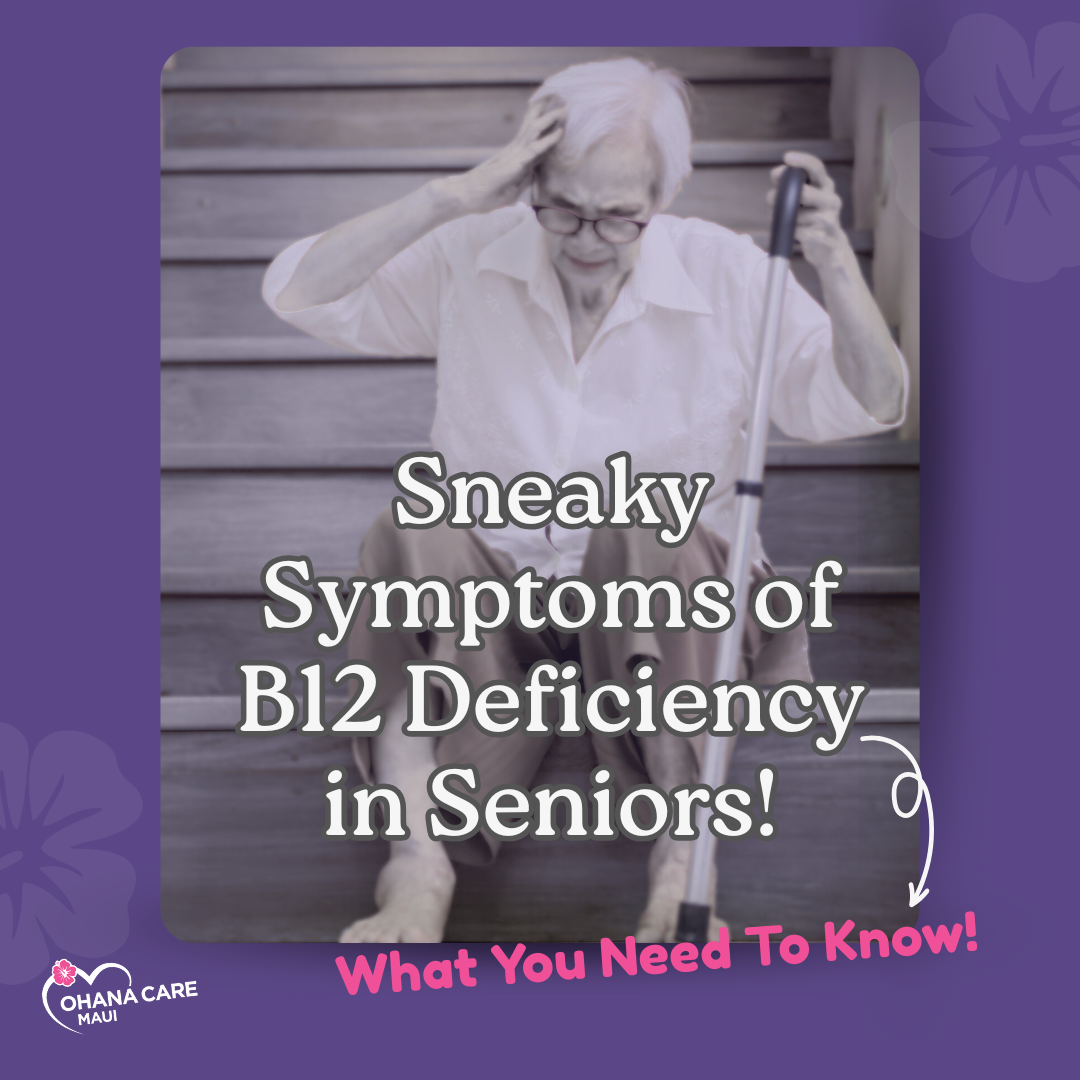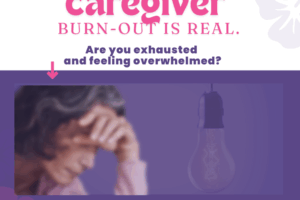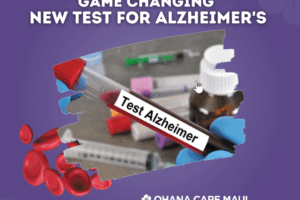Sneaky & Harmful – B12 and Aging. Yes, It Does Matter!

Read on to find out what you should know about B12 deficiency and aging adults.
Sneaky & Harmful – B12 and Aging.
Yes, It DOES Matter!
What you need to know about B12 deficiency and Aging – It does matter
It’s SO easy to brush off changes in how we feel as we get older…
A little forgetfulness? Probably just aging.
Feeling tired all the time? Maybe you didn’t sleep well.
But –
What if there’s something else going on?
Something simple, treatable, and often missed ?!
That’s where vitamin B12 comes in!
This essential nutrient plays a huge role in how our brains, nerves, and bodies function.
And the tricky part?
B12 deficiency is pretty common in older adults – and it’s so easy to miss!
As our body’s age, our ability to absorb B12 from food naturally decreases. In fact, it’s estimated that 10-30% of adults over age 60 don’t absorb B12 efficiently…
Walker Safety Tips for Seniors – Choosing & Using the Right One
Let’s Take a Closer Look.
Important questions about What You Need To Know:
-
-
-
-
-
- What does it actually do?
- What should you know about B12 and seniors?
- How do you spot a deficiency?
- What can you do about it?
-
-
-
-
What Does B12 Actually Do?
Vitamin B12 keeps your nerves healthy, helps make red blood cells, and supports your brain function.
It also helps convert food into energy – so you might feel more sluggish than usual when your B12 is low.
And while we don’t need tons of B12, we do need enough. When we don’t get it, things can start to go off track – especially for older adults.
“Vitamin B12 deficiency can be sneaky and harmful. It can cause a wide range of symptoms, including fatigue, nerve problems like numbness and tingling, muscle weakness, and problems with walking.
Over time, it can lead to memory loss, confusion, and even dementia.”
What you need to know about B12 deficiency and Aging – It does matter
The Sneaky Symptoms:
Here’s the kicker — B12 deficiency doesn’t always scream for attention. It creeps in.
You might notice you:
-
- Feel tired or weak more often
- Have Memory slip ups or trouble concentrating
- Tingling or numbness in your hands or feet
- Mood changes like depression or irritability
- Balance problems or a shuffling walk
- Pale skin or a tongue that’s red, sore
A lot of these symptoms sound like “normal aging,” right? That’s why it can go unnoticed!
And, blood tests don’t always catch it!
And – Some people can have “normal” B12 levels but still have symptoms of a deficiency.
Wait… What?!
That’s why doctors may also check things like methylmalonic acid or homocysteine levels when they’re suspicious.
So – What Can You Do?
The good news? B12 deficiency is usually easy to treat once it’s found.
-
- Get tested:
A simple blood test can check your levels. If symptoms are present, ask about additional tests.
-
- Take supplements:
Many people do great with over-the-counter oral B12 or sublingual (under the tongue) tablets.
-
- Get injections:
In cases where absorption is poor or your levels are really low, doctors may recommend B12 shots.
-
- Eat more B12-rich foods:
Think beef, chicken, fish, eggs, milk, and fortified cereals or plant-based products.
Dr. Leslie Kernisan emphasizes the importance of awareness:
“If there’s one vitamin that I’d like all older adults and family caregivers to know more about, it would be vitamin B12.”
– Dr. Kernisan, MD MPH, Better Health While Aging
Caregiver Tips — What to Watch Out For…
Here’s how you can help If you’re caring for an older loved one:
-
- Ask their doctor to check B12 levels – especially if they take medications or show any symptoms. It’s way too easy to misdiagnose the symptoms.
-
- Watch out for fatigue, tingly hands or feet, vision issues, balance problems, memory changes and confusion.
-
- Support a healthy diet that includes B12-rich foods or fortified products.
-
- Encourage follow-up appointments if supplements or injections are needed.
Final Take-aways:
-
- B12 deficiency can be sneaky, serious and often overlooked in older adults.
-
- Stay alert to the symptoms – with simple testing and treatment, it can be easy to manage.
-
- B12 can make a world of difference in daily energy, mood, and brain function.
-
- Don’t wait until symptoms become serious. If you’re a senior – or you care for one – ask about B12 at your next checkup. That one small step today can prevent bigger problems down the road.
-
- If something feels “off,” don’t ignore it. Talk to a doctor, ask about B12, and take that simple step toward feeling your best.
References:
-
- National Institutes of Health (NIH) – Office of Dietary Supplements
Vitamin B12 Fact Sheet
- National Institutes of Health (NIH) – Office of Dietary Supplements
-
- Mayo Clinic – Vitamin B12 Deficiency Vitamin B12 Deficiency
- Harvard Health – B12 Deficiency Can Be Sneaky Vitamin B12 deficiency can be sneaky, harmful
- WebMD – Vitamin B12 Deficiency
- Dr. Leslie Kernisan – Better Health While Aging: How to Detect & Treat Vitamin B12 Deficiency in Older Adults
~ If you’re worried or have questions, your doctor is there to help you and make recommendations. ~
* This information is for educational purposes and cannot replace a recommendation from your healthcare professional.*
For more information on Senior Health check out the following articles:
Depression in Older Adults – 7 Things to Know
OR
The Impact of Aging on Memory The Newest Insights!
Did You Know?
Our ‘Never-ending Training’ ensures our Nurse Aides are highly skilled and always learning something new!
We continually offer skill training in our classroom –
taught by experienced personnel and industry experts covering topics that range
from bedcare, dementia care, hospice care and safety techniques to proper lifting, transfers,
bathing, and so much more!
We’re More Than Home Care.  We’re Your Lifeline to Exceptional Care.
We’re Your Lifeline to Exceptional Care.
Ohana Care Maui
Part-time, Full-time or Temporary Home Care
Call Today for Free, Customized In-Home Care Consultation
From respite care to bedbound care and everything in between — including Dementia & Alzheimer’s.
24/7, Island-wide Services / Hawaii Licensed Home Care Agency / Woman-owned & Run
808-344-1285
OhanaCareMaui.com







